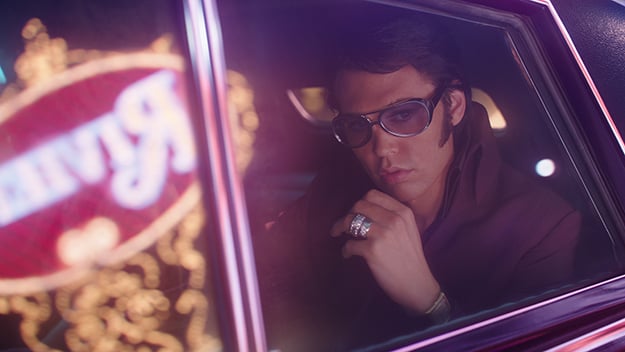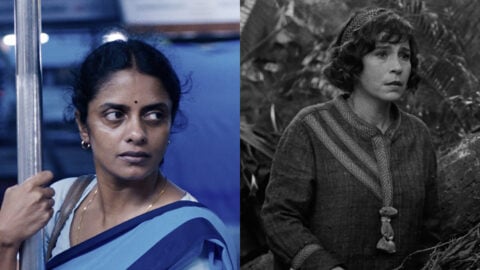No Business Like Snow Business
This article appeared in the June 30, 2022 edition of The Film Comment Letter, our free weekly newsletter featuring original film criticism and writing. Sign up for the Letter here.

Elvis (Baz Luhrmann, 2022)
One of the strangest, most improbable effects of Baz Luhrmann’s Elvis is that after over two and half hours of unrelenting garishness, the film’s obnoxious editing, historical inaccuracy, obvious dialogue, and didactic sermonizing suddenly melt away. The shock of the real that occurs near the film’s end, when Luhrmann cuts to archival documentary footage of Presley’s final 1977 performance, renders this blockbuster unexpectedly heartbreaking. The movie’s CGI flourishes and gaudy rap remixes pale against this image of a middle-aged man at the end of his rope, barely able to stand up but still finding solace in his art as he belts out a spine-tingling version of the cornball “Unchained Melody.” How do you communicate on screen the loneliness and pain of a figure who is more metaphor than man? Luhrmann’s answer (as always) is to go as big as possible in every way. In this sense, the filmmaker has perhaps found his perfect match: a performer whose humanity shone through even the glitziest rhinestone-encrusted suits.
Luhrmann’s Elvis is unique in that it deviates from the commonly told legend of Presley: that of a simple country boy with an untamable talent, devoted to Jesus and his mother Gladys, whom he was often seen nuzzling and calling his “best girl.” According to received wisdom—purveyed by John Carpenter in his 1979 made-for-TV Elvis—the singer’s talents lacked any design: that feverish music and those frenzy-inducing dance moves simply sprang from Elvis’s loins fully formed. It’s nearly impossible, at this point, to separate Elvis’s biography from this all-American myth of the purehearted, uncultivated hick-genius.
Luhrmann takes a different approach, imagining Elvis less as a holy fool and more as a willing mirror for the desires of others—someone who understands that mutual exploitation is the necessary cost of achieving his goals. In this film, Gladys becomes just one of many minor characters who swirl around the central duo: Elvis (a heavy-lidded Austin Butler) and his Mephistophelian manager, Colonel Tom Parker, whose emotional and financial entanglements are the film’s narrative engine. Played by Tom Hanks and several prosthetic chins, Parker is a sad and desperate hustler—an illegal Dutch immigrant and former carnival barker whose military title is a sham, and whose backstory is never fully revealed. Hanks has a great time with this giant Boss Baby, who narrates the goings-on in a cartoonish accent and constantly arches his eyebrows to make proclamations like, “To achieve truly great things, you have to make truly great sacrifices!” At one point, while showing the Presley family the Elvis lunchboxes and sweaters he’s selling, Hanks seems to slip into an impression of Mel Brooks as Yogurt in Spaceballs: “Moichindizing! Moichindizing! Moichindizing!”
Elvis’s youth and meteoric rise to stardom unfold as a flurry of cross-cut scenes from his childhood in Tupelo, Mississippi; his awkward teenage years in Memphis, where he’s mocked for his flashy pink clothes and dark eye makeup; his first recording sessions; and his preparations for his debut radio performance. In fact, nearly the entire first half of the film is a blindingly fast, nonlinear onslaught of backstory, jumping between the “present” of Elvis’s fame and his formative experiences, and between Parker’s versions of events and a more omniscient point of view.
Somehow this all coheres into a legible, even absorbing biography. But once we get to Elvis’s triumphant return to live performance in 1968, after a decade spent acting in lucrative Hollywood trash at Parker’s insistence, Luhrmann stumbles. The film tries to turn the production of the TV “Comeback Special” into a rebel stand, playing up Elvis’s fights with Parker and corporate bigwigs to include a song mourning the recent assassinations of Martin Luther King Jr. and Robert F. Kennedy. This generous spin on the milquetoast anthem “If I Can Dream” as a hard-won political gesture comes off as a lazy attempt to shoehorn some social commentary into the story.
Such glib gestures toward the complex racial politics that underlie the American pop industry abound in the film. In an early, whirlwind scene, Luhrmann intercuts Elvis’s electrifying 1954 debut on Louisiana Hayride with flashbacks to a Black tent revival where a skinny little Elvis, seized by the holy spirit of “race music,” convulses rhythmically. So begins, we are told, the blending of Black R&B and white country music that changed the world and broke down the color barrier. The film paints Elvis as a kind of embodiment of desegregation: in an indulgent bit of revisionism, he’s seen palling around in a Memphis speakeasy with Sister Rosetta Tharp, Little Richard, and B.B. King, who dispenses the immortal advice, “You don’t do the business. The business do you.”
But for all the boomer shibboleths that Luhrmann trots out to contrive a liberal reading of history, his interest lies less in any political or cultural analysis than in the simple, primal powers of sound and image. Throughout the film, Parker—who ultimately cannibalized Elvis’s final years, chaining the singer to the Vegas stage to pay off his own gambling debts—repeatedly refers to himself as “the Snowman” and quips that he works in “Snow business.” This is, according to him, carny slang for the creation of spectacles designed to provoke repressed desires in the audience. In Elvis, he found the perfect vessel for his work: a squeaky-clean Trojan horse of seething sexuality, upon whose talents Parker constructed an increasingly creaky empire. Luhrmann’s maximalist showmanship is an update of Parker’s carnival-barker approach. It’s exhilarating, sure, but also exhausting, and as the film proceeds, one wonders whom the director sympathizes with more: Presley, the raw talent, or Parker, his scheming mythmaker?







